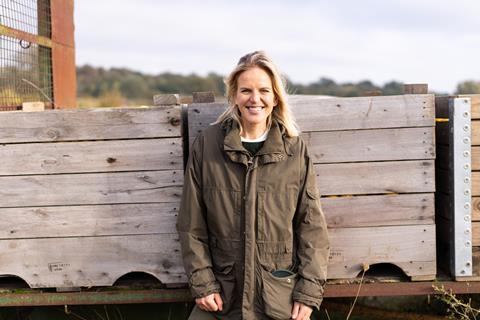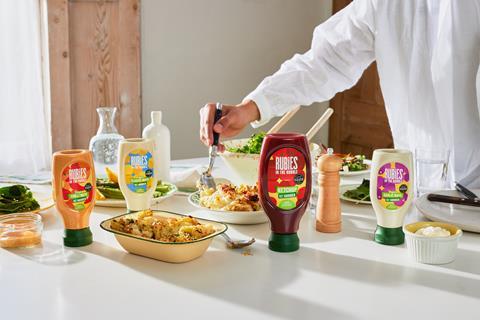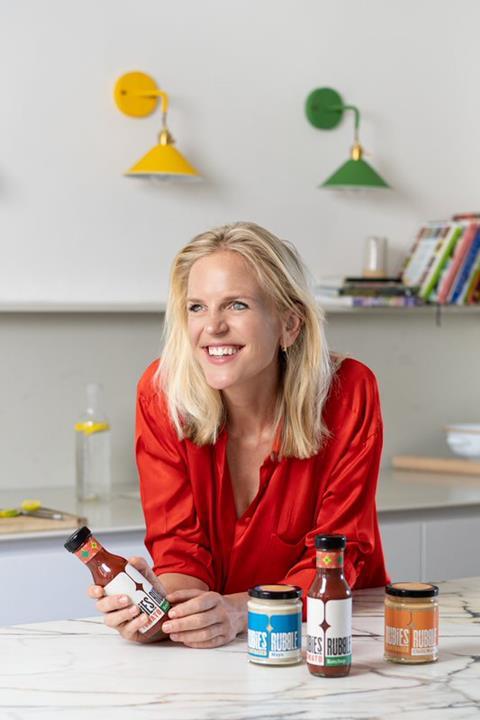Jenny Costa, the visionary behind award-winning brand Rubies in the Rubble has an accessible message of hope and empowerment

One late afternoon in 2012, as 25-year-old Jenny cycled through London traffic on the way home from work, she paused to pick up an Evening Standard newspaper. Flicking through, an article caught her eye: ‘Bin Divers’. Apparently, people were risking arrest by rummaging through supermarket bins to rescue food that was past its sell by date but still edible.
Jenny grew up in the middle of nowhere on the west coast of Scotland – imagine a small farm and thriving vegetable garden, sitting like an oasis in a rugged landscape – with frugal parents who were conscious about food waste and careful stewards of their produce. Jenny had never contemplated waste on a bigger scale. As she continued cycling she started to wonder: “What happens to the food not sold in supermarkets? With an erratic supply chain (that’s governed by weather, which is unpredictable) combined with erratic humans (who are equally as unpredictable, choosing something different to eat every night) and supermarkets caught in the middle, wanting to showcase a plentiful abundance of food…what happens when supply and demand don’t add up perfectly?”
Arriving home, Jenny began her research. She read that we waste a third of what we produce globally; that agriculture is the single-largest impact that we humans have on our planet; that we are planning to double our food supply by 2050, while continuing to waste a third of everything we produce. Mindboggling statistics. “Why are we not talking about this more?!” she wondered.
“It got me thinking about our wonderful, abundant planet, that can sustain everybody on it, but how woefully out of balance our food chain is,” she recalls. “We’ve got the extremes of people with plenty wasting food without thought, and then those who can’t afford to eat or don’t have enough.”
Our wonderful, abundant planet can sustain everybody on it, but our food chain is woefully out of balance
The average person might have felt overwhelmed when faced by this reality, but Jenny felt mounting excitement. Compelled to respond, she set her alarm for 4am the next morning and endured a bracing cycle in the icy late November air, down to New Covent Garden’s wholesale fruit and vegetable market to see for herself.
“I fell in love with the buzz,” she shares. “The bright lights and bustle inside a huge warehouse; forklift trucks going everywhere and people selling pallets full of tomatoes, bananas and potatoes. It was amazing.” A mere 500 metres from this excitement was a waste tip of unsold, discarded produce, with pallets of beans and Kenyan mangoes. “I couldn’t see what was wrong with them. It made me think of my mum’s fruit and veg garden. Whenever she had an overabundance she would turn it into jams, chutneys, relishes and pickles – preserving it in the traditional way.”
Jenny loaded her rucksack and bike basket with discarded produce and cycled home, immediately calling her mum to get hold of the family recipes. That night, she cooked…and there was no going back. “It was like I’d found diamonds in the dust – there was so much value in what was being thrown away. I decided there and then to develop a fun brand around valuing what we have and making sure nothing is unnecessarily wasted, and I named it Rubies in the Rubble.”

Liberating fearlessness
It’s no coincidence that the vision for Rubies emerged in the years following Jenny encountering God through an Alpha course and experiencing a re-invigorated faith. “The whole concept behind Rubies was built on a need to see the innate beauty and value in everything,” she shares, describing the gospel in a nutshell. “I wanted to turn what others would see as rubbish into something that’s glistening in a jar and give it new life.”
Jenny’s upbringing fostered an honest connection with the earth and an intuitive sense of duty to be good stewards of what we have. This, combined with a fearless, vibrant, life-transforming faith was catalytic. She had the passion and gumption to take risks for God. “I had a deep sense that God had a plan for me; that he was with me and that I had nothing to fear,” Jenny explains. “I had finished my degree in Mathematics and had a job with a hedge fund. I really enjoyed it but it didn’t reflect my passions. I found myself wondering how I would feel looking back aged 40. Is this how I want to spend my life?”
Family and friends questioned her passion for chutney-making, saying: “It’s not going to make you millions.” But Jenny explains: “I felt such a peace. It seemed a bit reckless to leave a cushty job, but I knew that the only thing holding me back was fear of man, and holding on to the things we value on earth. I trusted that God had put this on my heart and all I needed to do was go after it wholeheartedly and trust that it would show a bit of his kingdom.”
Letting God in and holding things lightly
Jenny has continued to hold the vision lightly, riding the inevitable challenges while revelling in her passion. She’s inspired and motivated, but she doesn’t drive it; underlying everything is a constant assurance that “God’s got it. It’s in his hands.” Ten years on, the brand has transformed and developed while always staying true to the original vision. Initially, it featured homemade chutneys and pickles packaged in old jars, adorned with offcuts of material, tied with string and sold by weight on market stalls. Now, it produces wholesale tomato ketchup and vegan mayonnaise in factories, reaching a broader market by being sold in major supermarkets such as Waitrose, Tesco and Ocado.
It was like I’d found diamonds in the dust – there was so much value in what was being thrown away
“The hardest part for me was when we switched our business plan from making things in our own kitchen to scaling up and outsourcing production,” Jenny reflects. “In 2018 we received a small investment and were encouraged to develop mainstream condiments, acknowledging that half the country don’t eat chutneys.” While this was a significant and somewhat jarring shift for Jenny, it was also a pivotal time of growth, allowing Rubies to have more widespread impact and a louder voice in the food waste movement.
Jenny sees the potential for more growth: “I’d love Rubies to be an umbrella brand of different product ranges that all raise awareness; partnering with others to have a bigger impact.” She sees the possibilities, but she holds them lightly. “But I don’t think God always gives us a clear or specific way forward; he just asks us to do the best with what we’ve got and do it with him,” she explains. “As long as we’re letting him in enough to direct it and holding it lightly enough that we’re not strangling it, then we’ll keep moving forward. I’m excited to see which doors he opens next on the adventure.”

A message of value
A Rubies product carries so much more than ketchup. “The thing we concentrate on most is how we can contribute to the food waste movement and help people feel empowered to respond,” Jenny shares. “We want our products to carry a message of value; that we need to see everything around us as precious, and value what we have on this earth.” It can be easy to look at food waste facts and feel overwhelmed by the scale of the problem, opting to blame supermarkets and restaurants. But Jenny points out that a lot of food waste happens at home and that there are significant steps we can take to collectively make a change. “Don’t feel defeated,” she urges, “keep it light, keep it simple. Challenge yourself: can I have a zero food waste week?”
Ensuring a zero food waste week
Here are four do-able top tips from Jenny.
1. Acquaint yourself with what’s in your fridge and make a plan. It’s simple, but how often do we forget what’s in it? Check when things are going to go off and make a plan of how you’re going to use them (have fun with this and get creative!).
2. Can you save what’s going off? Make breadcrumbs out of old bread and freeze them; pour that half-opened bottle of wine into ice cube racks to use in future risottos; cook up old vegetables and blitz them into a soup. Make sure you have containers and labels to hand.
3. Make a shopping list of what you need. Avoid aimlessly wandering round the supermarket putting random things in your trolley. Always go with a specific list to stay focused on what you need.
4. Buy what’s in season. For a bigger impact, discover what’s in season and plan meals accordingly. Supermarkets often showcase the same foods, causing us to overlook the surplus of certain items, such as sweet potatoes, that local farmers are likely to have during specific times of the year.
For more information and inspiration head to the Rubies in the Rubble ‘Goodism’ blog goodism.rubiesintherubble.com



























No comments yet